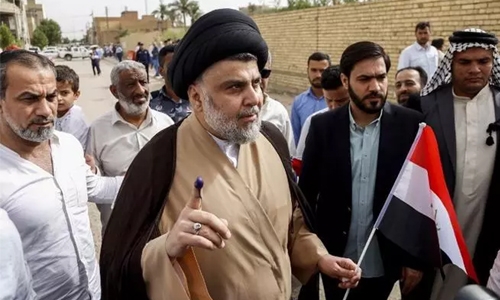What hope for Iraq’s new technocrats?
In recent weeks, Iraqis were offered the unusual opportunity to apply for ministerial roles in a new government that has already been six months in the making. The staff of prime ministerial nominee Adel Abdul Mahdi are currently scrutinising 36,000 applications received so far! The fact that such a gimmick is being countenanced is a damning indictment of the lack of capable, credible and clean figures within Iraq’s political class. Replacing familiar, corrupt and incompetent factional appointees with independent technocrats has often been proposed, notably by cleric Muqtada Al Sadr, whose list came top in the May elections. Previous attempts to appoint technocrats produced mixed results.
Prime Minister Haider Abadi’s 2016 efforts to bring independent experts into government were thwarted by powerful vested interests. Meanwhile, independent figures are no less susceptible to huge temptations for personal enrichment that accompany such roles, along with efforts by powerful factions to buy off these political lightweights.
By 2006, Iraq’s Interior Ministry had been thoroughly discredited. Interior Minister Bayan Jabr, who hailed from the Tehran-sponsored Badr Brigades, had flooded the ministry with his paramilitary cadres. These personnel helped spearhead the sectarian bloodletting that engulfed Baghdad between 2005 and 2008. Jabr and Prime Minister Ibrahim Jaafari lost their posts after secret prisons came to light, in which thousands of detainees had been subjected to the most grotesque methods of torture.
Jabr was replaced by independent Shiite politician Jawad Boulani, considered a technocratic safe pair of hands. However, in a ministry dominated by omnipotent Iran-backed militants, Boulani was a lamb among wolves: “He has got to be careful about what he does just to stay alive,” one Western diplomat said. Killings attributed to Interior Ministry personnel continued at high levels throughout his tenure. After Boulani, Prime Minister Nouri Maliki ran the Interior Ministry, until in 2014 the department was given back to the Badr Brigades (now part of the Al Hashd Al Shaabi paramilitary coalition). Badr is today resolved to retaining its position, no matter who is nominally in control.
The appointment of independent new faces is thus not a panacea for Iraq’s problems. Abdul Mahdi is nominally independent, but for years he was a leading official in the Iran-sponsored Supreme Council for Islamic Revolution in Iraq, so he cannot be expected to robustly confront Iranian meddling. At worst, such independent figures are window-dressing to appease the West, while the usual suspects continue pulling the strings behind the scenes.
The US shortsightedly regards Iraq’s post-2014 crisis as solved, despite Daesh undergoing a resurgence, while Al Hashd militants play a central role in Cabinet-formation efforts. American diplomats pat themselves on the back that Abdul Mahdi is their man, despite his appointment apparently being confirmed duringa Beirut meeting between Al Sadr, Hezbollah leader Hassan Nasrallah and Qasem Soleimani, commander of Iran’s Quds Force (Al Sadr previously admitted to being a huge fan of Nasrallah, and Iran has consequently used Hezbollah’s leader every time they want to exert influence over Al Sadr).
As part of the same machinations, pro-Iran factions outmaneuvered the leading Kurdish and Sunni Arab parties that were supposed to choose the (Kurdish) president and the (Sunni Arab) Parliament speaker. Al Hashd’s successful candidates, Barham Saleh and Mohammed Halbousi, lack a natural support base and are thus seen as easy to manipulate.
Lebanon, which also had elections in May, is making sluggish progress toward forming a government. Although Saad Hariri is set to remain prime minister, Hezbollah wields more influence than ever. In recent days it was Nasrallah, not Hariri, publicly discussing how the Cabinet would be formed, reinforcing the perception that this process is proceeding on his terms.
For Iranian preeminence to be challenged, the international community must be more engaged than ever. Independent technocrats will proceed like lambs to the slaughter if they are abandoned to be coopted, blackmailed or threatened into acquiescing to Tehran’s agenda. Likewise in Lebanon, we cannot delude ourselves that Hariri is someone the world can do business with, when he is effectively an isolated figurehead for a regime hostile to the country’s national interests.
In Beirut and Baghdad, forming governments and appointing top figures are routinely delayed while Iran’s allies veto progress until they get the appointees they want. This makes for months of dysfunctional governance when life-and-death national issues are indefinitely put on hold. Yet while parliamentary politics remains gridlocked, Nasrallah retains a free hand to belligerently exacerbate tensions with neighbouring states, inching Lebanon closer to catastrophe. Distancing insatiably corrupt factions from the tap of state spending simply encourages more imaginative scams to syphon off these funds through alternative sources of liquidity.
Al Sadr’s and Abdul Mahdi’s aspirations for a technocratic national government are a seductively attractive vision, but will it be a smokescreen for sectarian paramilitaries grabbing more power and implementing their murderous agenda of sectarian cleansing across Iraq? If the political system itself is diseased, then those acquiring governing positions ultimately become corrupted. Iraq and Lebanon need more than fresh faces to achieve a fundamental change of course away from the dysfunctional, sectarian and kleptocratic political models that have prevailed for decades.
If aspirations for a democratic future are to be achieved, these states require effective institutions rooted in the rule of law, accountability, and an ethos of service on behalf of all citizens. After long, tedious months of backroom deals, the eventual confirmation of these governments may be widely celebrated as a new dawn for Lebanon and Iraq. In reality, if these nominally democratic systems are genuinely to be rescued from corrupt, sectarian and militant forces backed by hostile states, this is just the beginning of a long and infinitely more complex and traumatic process.
Related Posts

